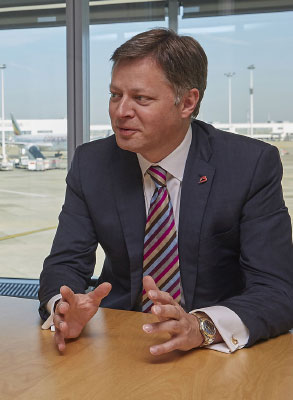
Brussels Airport was commended in the ‘10-25 million passenger’ category at this year’s ACI EUROPE Best Airport Awards. “It is nice acknowledgement of the hard work by all of the airport employees. All 20,000 employees on the Brussels Airport site contribute to our success, and let us not forget the 40,000 employees indirectly involved in our daily operations,” Arnaud Feist, CEO Brussels Airport Company, commented.
Brussels Airport can reflect on myriad successes over the past 12 months, not least its record traffic figures, eight new airlines, the opening of its emblematic new ‘Connector’ building, and the recently completed runway renovation programme. These all contributed to the airport being commended in the ‘10-25 million passenger’ category at this year’s ACI EUROPE Best Airport Awards. Arnaud Feist, CEO Brussels Airport Company, outlined the latest developments to Samantha Jenkins.
Regular readers will recall our lead interview with Brussels Airport Company CEO Arnaud Feist in the Spring issue of Airport Business. At that time, we reported on record passenger numbers, an award-winning route development strategy, and impressive infrastructure developments.
Brussels Airport has further built on that success in the intervening months, resulting in it being commended in the ‘10-25 million passenger’ category at this year’s ACI EUROPE Best Airport Awards. The judges praised the airport for “significantly improved connections, and record traffic”, in part due to a €75 million investment in the new ‘Connector’ building. “It is nice acknowledgement of the hard work by all of the airport employees,” Feist told Airport Business. “All 20,000 employees on the Brussels Airport site contribute to our success, and let us not forget the 40,000 employees indirectly involved in our daily operations.”
The airport’s success can, in part, be traced back to the adoption in 2012 of a new strategy, which places the passenger at the heart of everything Brussels Airport does. “Connector is the emblem of this strategy, because its primary purpose is to further improve the quality of the airport infrastructure for our passengers and airlines,” Feist commented.
This €75 million investment in Connector is part of a wider €1 billion programme designed to allow the airport to strengthen its competitive position, while improving the infrastructure and customer service. The next projects involve comprehensive runway renovation, the renovation of Pier B and its commercial area, a renewed arrivals hall, and potentially an extension to Pier A.
The headline figures illustrate Brussels Airport’s success over the past year. Feist is justifiably proud of a strong performance which saw 15% year-on-year growth to almost 22 million passengers in 2014, eight new airlines in 2014-2015, 360 new flights per week, and 26 long-haul flights serving Brussels every day. “Our route development strategy is particularly focused on Star Alliance,” Feist said. “With Brussels Airlines as our home carrier, we have the opportunity to develop as a prime Star Alliance hub in Europe. We would like to add carriers such as Singapore Airlines, Air China, and South African Airways, and more US destinations through United Airlines.”
In June, All Nippon Airways (ANA) announced a daily service from Tokyo, launching on 25 October. “It confirms Brussels Airport is attractive for more long-haul routes. However, our strategy is not only focused on Star Alliance. We also work closely with other alliances, with low-cost airlines, and with our two other home-based carriers Jetairfly and Thomas Cook Airlines,” Feist added.
Runway renovation programme
The significant investment being made to accommodate this continued growth and further enhance the passenger experience has, in addition to Connector, included automatic access gates, scan&fly baggage drop-off, an upgraded smartphone app, and a modern new 25-lane security screening platform in the Connector building. Brussels Airport is also committed to the environment, and is accredited at the Optimisation level of Airport Carbon Accreditation. Feist explained that it invests in permanent noise monitoring, CO2 reduction, solar panels, and electric vehicles.
The most recently completed element of the investment programme is the renovation of runway 25L/07R, the third and final stage of which was concluded in September. The asphalt surface layers have been replaced, the runway shoulders and drainage system renewed, the sewerage renovated, and the runway lighting replaced with energy-efficient LED lighting. Using LED lamps instead of halogen lamps will result in electricity savings of 420,000 kilowatt-hours per year. This corresponds with the annual electricity consumption of 115 households (3,500 kWh/year) and a carbon reduction of 116 tonnes per year. The airport’s other two runways will be renovated in the coming years.
As Brussels Airport continues to build on the many successes of the past year, Feist explained that it is encouraged to enter the 2016 ACI EUROPE Best Airport Awards. Projected growth in passenger and cargo volumes, new long-haul routes such as ANA’s Tokyo service, new commercial developments, and a steep rise in commercial revenues, are among the contributory factors. “We Belgians are relatively modest. However, for Brussels Airport, we think we could earn another strong commendation, or even more, next year,” Feist concluded.







